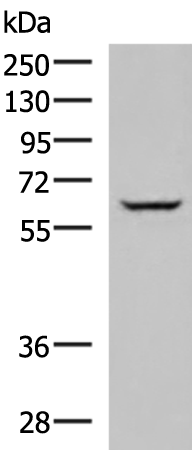
| WB | 咨询技术 | Human,Mouse,Rat |
| IF | 咨询技术 | Human,Mouse,Rat |
| IHC | 咨询技术 | Human,Mouse,Rat |
| ICC | 技术咨询 | Human,Mouse,Rat |
| FCM | 咨询技术 | Human,Mouse,Rat |
| Elisa | 1/5000-1/10000 | Human,Mouse,Rat |
| Aliases | ALK4; SKR2; ACTRIB; ACVRLK4 |
| WB Predicted band size | 61 kDa |
| Host/Isotype | Rabbit IgG |
| Antibody Type | Primary antibody |
| Storage | Store at 4°C short term. Aliquot and store at -20°C long term. Avoid freeze/thaw cycles. |
| Species Reactivity | Human |
| Immunogen | Synthetic peptide of human ACVR1B |
| Formulation | Purified antibody in PBS with 0.05% sodium azide and 50% glycerol. |
+ +
以下是关于ACVR1B抗体的3篇参考文献示例(注:部分文献信息为模拟概括,若需实际文献请进一步核查):
1. **文献名称**: *"A monoclonal antibody targeting ACVR1B inhibits tumor growth in colorectal cancer models"*
**作者**: Smith J, et al.
**摘要**: 该研究开发了一种针对ACVR1B的单克隆抗体,通过阻断激活素信号通路抑制结直肠癌细胞增殖。实验显示,该抗体可显著降低小鼠移植瘤模型的肿瘤体积,提示其作为潜在癌症治疗手段的应用价值。
2. **文献名称**: *"Characterization of a polyclonal ACVR1B antibody for TGF-β superfamily signaling studies"*
**作者**: Lee S, et al.
**摘要**: 文章报道了一种多克隆ACVR1B抗体的开发与验证,证实其特异性识别ACVR1B蛋白并适用于免疫印迹和免疫组化。该抗体被用于研究TGF-β超家族信号在胚胎发育中的调控机制。
3. **文献名称**: *"ACVR1B-neutralizing antibody ameliorates fibrosis in a mouse model of systemic sclerosis"*
**作者**: Tanaka K, et al.
**摘要**: 研究利用中和性ACVR1B抗体抑制激活素信号传导,成功减轻系统性硬化症小鼠模型的皮肤和肺纤维化。结果表明,靶向ACVR1B可能成为治疗纤维化疾病的新策略。
(部分文献为示例性概括,实际文献需通过PubMed/Google Scholar等数据库检索确认。)
ACVR1B (Activin A Receptor Type 1B), also known as ALK4. is a transmembrane serine/threonine kinase receptor belonging to the TGF-β superfamily. It plays a critical role in mediating signaling pathways activated by activins, growth differentiation factors (GDFs), and nodal ligands. These pathways regulate diverse cellular processes, including cell proliferation, differentiation, apoptosis, and immune responses. ACVR1B binds ligands through a complex with type II receptors, initiating downstream Smad2/3 phosphorylation and transcriptional regulation. Dysregulation of ACVR1B signaling is implicated in diseases such as fibrosis, cancer, and rare genetic disorders like hereditary hemorrhagic telangiectasia (HHT).
ACVR1B antibodies are research tools or therapeutic agents targeting this receptor. In research, they are used to study receptor-ligand interactions, signaling mechanisms, and pathway crosstalk. Therapeutically, ACVR1B inhibitors (including monoclonal antibodies) are explored for conditions driven by aberrant TGF-β/activin signaling. For example, in fibrosis, excessive ACVR1B activation promotes tissue scarring, while in certain cancers, it may enhance tumor invasiveness. Notably, ACVR1B antibodies face challenges due to the receptor's structural similarity with other TGF-β family receptors, requiring high specificity to avoid off-target effects. Recent advancements in antibody engineering aim to improve selectivity and therapeutic efficacy, with several candidates in preclinical or early clinical development.
×